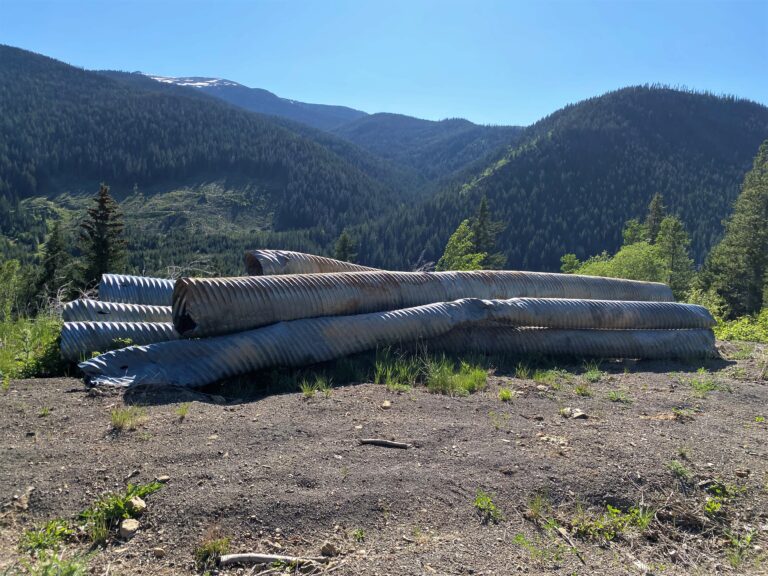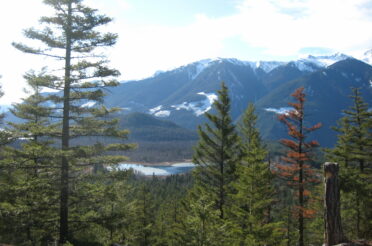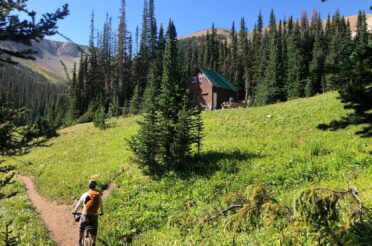Road Deactivation & Removing Culverts

Large corrugated metal pipes, some twisted or partially crushed, some rusted with age, piled up by the side of the road. This is an important part of conservation of the Chilcotin Ark, so we are always appreciative to see these culvert pipes and the wildlife benefits they represent.
Let’s start with where these culverts come from. When the logging companies build logging roads, these culverts are put into the road to direct the water flow off the road or to allow a road to cross a small creek without building a bridge. The off-shoot or branch roads the logging companies build are temporary roads, designed to give them access to fall the trees and remove them. Once the logging is completed and new trees have been replanted, the roads are deactivated to reduce human access and displacement of wildlife from their prime habitat.
Most logging has lots of benefits for wildlife as it creates good habitat for all species of wildlife for 15-20 years after logging is completed. This is because light is now able to get all the way to the forest floor. New growth that would previously not have been able to grow because of the tree cover is now available for the wildlife to feed on. Recent clear cuts are a great place to see mule deer, bears and moose. Logging in most areas mimics areas of forest that would have been cleared every hundred years or so by a forest fire which would have taken out the canopy and allowed new growth.
In mule deer winter range a sustainable road density is 1/2km of logging road per km2. More than this and the wildlife – mule deer and other animals – will start to become displaced as there is too much human access. Deactivating logging roads to this density creates a natural limiter on how many people can access the area and those that do are only in a certain area. It also prevents motorized vehicle access. Wildlife still have most of the area where they are undisturbed by humans.
As well as maintaining the sustainable road density of 1/2 km of logging road per km2, it is also important to deactivate the right roads. The roads that are in wildlife winter ranges are more important to deactivate than roads where wildlife were never present. By working with local logging companies, the Chilcotin Ark Institute prioritizes which are the most important roads to deactivate.
What happens if the roads aren’t deactivated? Motorized vehicles can be ridden into the alpine high above the 1700m motorized vehicle closure. With no trees and wide open spaces, these users can ride wherever they want, making new “trails” all over the alpine. While this displaces the wildlife such as mule deer, mountain goats, California Bighorn sheep and grizzly bears, it also has highly detrimental effects on the plants and soil. Bike use creates ruts which the water runs into and makes deeper and deeper. Soil becomes eroded, plants are destroyed, soon the alpine is a dust bowl where nothing grows, the wildflower meadows, rich with red, yellow, blue, white and pink flowers are gone. With the food source gone and motorized vehicle disturbance, the wildlife will leave too. This kind of damage takes decades to recover.
One way that roads are deactivated is to remove the culvert pipes. Now the creeks return to their original flow which limits motorized vehicle access to the area, including ATVs, snowmobiles and dirt bikes. In parts of the Chilcotin Ark, there is a motorized vehicle closure above 1700m, deactivating these logging roads helps to enforce this regulation as vehicles no longer have easy access to the alpine.
By removing culverts and allowing the natural flow of the water to cross the road, the logging companies are making their contribution to the conservation of the wildlife, wild plants and ecosystems of the Chilcotin Ark.
The Chilcotin Ark Institute appreciates the logging companies for playing their part in conservation and being stewards of the Chilcotin Ark.
Charlie



